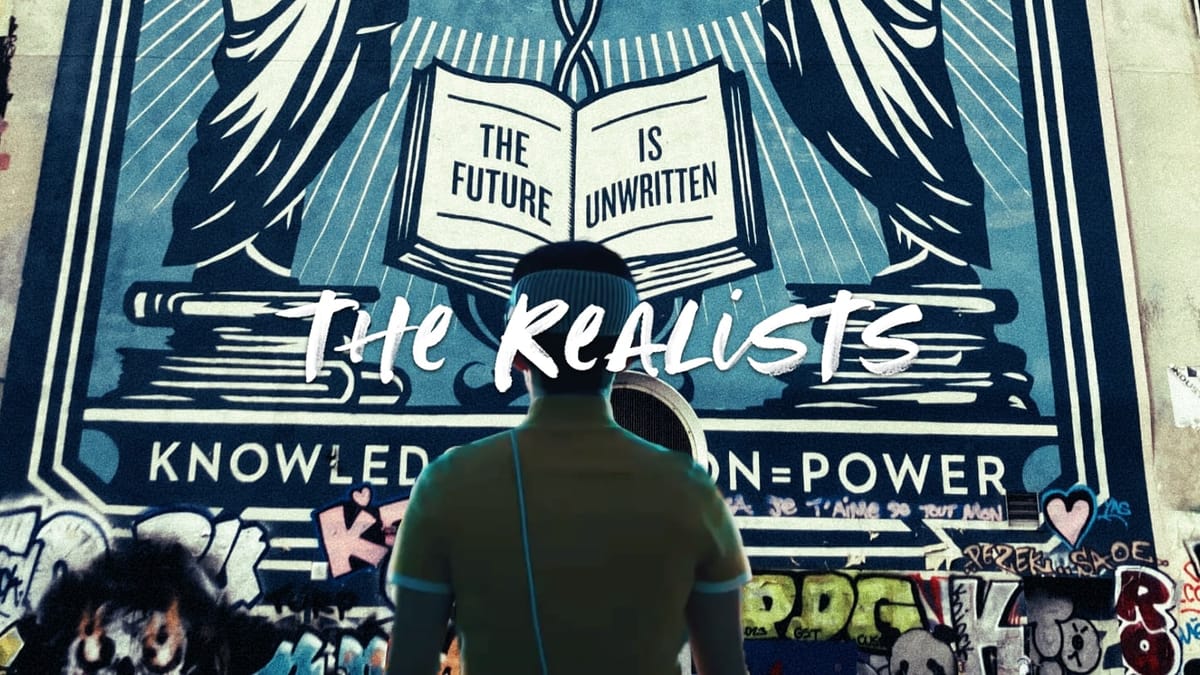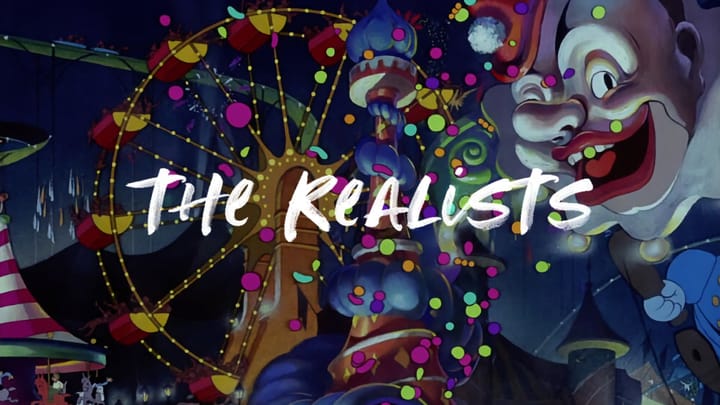Visions of the Future: How to Be a Realist in a Techno-Optimist World
Will the real world be rendered boring and bland by spatial computing? Is this future inevitable? And what would the great Neil Postman have said about all this?

We are on the cusp of a new era.
Apple – the world's second largest company by market cap ($2.85 trillion as of Feb. 1, 2024) – is putting significant R&D and marketing efforts in the promotion of a new product (Vision Pro) and a new tech category: spatial computing – as in, a computer you wear on your face that blends the physical and digital worlds.

Tremendous cultural and societal changes are potentially on the horizon. The risk? The real world seeming too boring to experience without tech overlayed on top of it.
An even bigger risk: the invasion of our private moments for advertising purposes - where every second of our lives become an opportunity by Big Tech to sell us something. Ubiquitous, micro-targeted, constant advertising.
I think we don’t realize how lucky we are this very moment, when opportunities to be exposed to microtargeted ads are limited to the time we spend on our computers and smartphones (if we don’t have adblock or a pi-hole turned on).
"A tech fentanyl dealer posing as a rehab provider"

Journalist Nick Bilton recently wrote a feature for Vanity Fair about Apple's Vision Pro and the Cupertino-based company’s big bet on spatial computing: "Why Tim Cook Is Going All In on the Apple Vision Pro."
This is how Bilton felt after taking off Vision Pro and experiencing the world as it is:
When I take it off, every other device feels flat and boring: My 75-inch OLED TV feels like a CRT from the ’90s; my iPhone feels like a flip phone from yesteryear, and even the real world around me feels surprisingly flat. And this is the problem. In the same way that I can’t imagine driving a car without a stereo, in the same way I can’t imagine not having a phone to communicate with people or take pictures of my children, in the same way I can’t imagine trying to work without a computer, I can see a day when we all can’t imagine living without an augmented reality. When we’re enveloped more and more by technology, to the point that we crave these glasses like a drug, like we crave our iPhones today but with more desire for the dopamine hit this resolution of AR can deliver. I know deep down that the Apple Vision Pro is too immersive, and yet all I want to do is see the world through it.
I've been haunted by Bilton's testimony ever since I've read this article. Even more chilling is what followed:
“I’m sure the technology is terrific. I still think and hope it fails,” one Silicon Valley investor said to me. “Apple feels more and more like a tech fentanyl dealer that poses as a rehab provider.” Harsh words, but he feels what we all feel, a slave to our smartphone, and he’s seen this play before and he knows what the first act is like, and the second act, and he knows how it ends.
I read Bilton's article as I was in public transportation last weekend while I was out running errands. As I stepped on a crowded subway platform, waiting for a train that would take me to a restaurant, where my husband and my daughter were waiting for me, I could not stop thinking about Bilton's words. My first thought was: it's really nice to see other people's faces. Am I witnessing the last days and months of an old world, before Vision Pro and copycat spatial computing goggles go mainstream? What will the world look like for my daughter 10 years from now? Will most people be moving around with a VR headset strapped on their faces? Or will these remain a niche product like Google Glass and Snap Spectacles and Oculus headsets?
This technology will surely evolve over the years, making spatial computing devices lighter and less obtrusive. I wouldn’t be surprised if a decade from now this technology will be incorporated in contact lenses or elegant glasses - impossible to notice by a casual observer.
Why is this a problem? Through spatial computing, Big Tech will surely be able to mine even more personal data and exploit uncharted parts of our lives for commercial purposes. 24/7 surveillance and data mining that will potentially rob us of our privacy and lead to behavioral changes in service of commerce and consumerism. Advertising may become even more embedded in our everyday lives, with exposure to ads a constant in augmented reality spaces. Just think about the film Minority Report and the future it envisioned:
The Future is Unwritten: Knowledge + Action = Power
Earlier this week, as I was walking through central Paris after a meeting, I spotted a giant mural that left me speechless for its powerful message and its timeliness. I immediately recognized the style of Shepard Fairey, who has created other iconic murals in Paris (in addition to Obama’s famous campaign poster). This work - on a wall near the Stravinsky Fountain, next to a Jef Aerosol giant pochoir - shows two women, depicted in Art Nouveau style, each standing on a pile of books and stretching their arms, as if they’re holding a lotus flower. An open book at their feet says “The Future is Unwritten” and below there’s the sentence “Knowledge + Action = Power.”

We live in a techno-optimist world, where technological change is heavily promoted by companies who reap large profits from it, without much thought about societal consequences.
Remember the quasi-religious fervor the world witnessed after Steve Jobs introduced the first ever iPhone in 2007? The device was quickly nicknamed the “Jesus phone” and even Apple’s own advertising played on this. My pet peeve during the 2000s-2010s? Introductions of new platforms and devices by Big Tech, followed by fawning articles by tech reporters. Articles that read like glorified press releases, without much critical thought put into them.

Well, the tides have turned. I am feeling a glimmer of hope following the introduction of Apple’s Vision Pro: from The Verge to Wired to the New York Times, the most shared sentiment in reaction to the release of this device was skepticism and head-scratching regarding its usefulness.
- The Verge: Apple Vision Pro review: magic, until it’s not
- Wired: Apple’s Vision Pro Isn’t the Future
- The New York Times: Vision Pro Review: Apple’s First Headset Lacks Polish and Purpose
A future where we walk around with a device our face that blends the real world with the digital world is not inevitable.
The future is still unwritten.
We can object to such a future - like people did 10 years ago with the introduction of Google Glass. Remember that people who wore Google Glasses out in public where called “Glassholes”?
According to Wikipedia:
Google started selling a prototype of Google Glass to qualified "Glass Explorers" in the US on April 15, 2013, for a limited period for $1,500, before it became available to the public on May 15, 2014. It had an integral 5 megapixel still/720p video camera. The headset received a great deal of criticism amid concerns that its use could violate existing privacy laws. On January 15, 2015, Google announced that it would stop producing the Google Glass prototype. The prototype was succeeded by two Enterprise Editions, whose sales were suspended on March 15, 2023.
Winners and Losers
The introduction of this new product category inspired me to rewatch an iconic lecture by the late Neil Postman: “Six Questions about Technology” (held at Calvin College in 1998).
Postman said:
[Only] a fool doesn’t know that new technology always produce winners and losers and there is nothing irrational about loser resistance. Bill Gates who is of course a winner knows this and because he is no fool, his propaganda continuously implies that computer technology can bring harm to no one. Well that's the way of winners – they want losers to be grateful… and enthusiastic… and especially - best of all - to be unaware that they are losers.
This is such a powerful concept worth repeating: "they want losers to be grateful… and enthusiastic… and especially - best of all - to be unaware that they are losers."
Later he continued:
Television gives power to some, while it deprives others and that is true of every important medium and this fact has always been understood by intelligent entrepreneurs who see opportunities emerging from the creation of new media. And that that's why media entrepreneurs are the most radical force in culture. They are interested in maximizing profits of new media and do not usually give much thought to large scale cultural effects. America's greatest radicals have always been our entrepreneurs: (Samuel) Morse, (Alexander Graham) Bell, (Thomas) Edison, (David) Sarnoff, (Walt) Disney. These men created the 20th century as Bill Gates and others are creating the 21st. I don't know if much can be done to moderate the cultural changes that media entrepreneurs will enforce. But citizens ought to know about what is happening and keep an attentive eye on such people.
Knowledge: Postman’s Six Questions
Here are the six questions cultural critic Neil Postman said we should always ask ourselves when a new technology is introduced.
Keep in mind Apple’s Vision Pro and the new field of spatial computing when reading them:
- What is the problem to which this technology is the solution?
- Whose problem is it?
- Which people and what institutions might be most seriously harmed by a technological solution?
- What new problems might be created because we have solved this problem?
- What sort of people and institutions might acquire special economic and political power because of technological change?
- What changes in language are being enforced by new technologies, and what is being gained and lost by such changes?
Action: Resist
Similarly with what happened with Google Glass 10 years ago, we can reject and label as creepy recording devices that sits on one’s face - when one is out in public. I’m sure there can be interesting use cases at home, while watching movies for example. But we don’t need to see people in these recording headsets out in the street.
We collectively rejected Google Glass 10 years ago - and the product went bust.
In this case outright rejecting Apple’s Vision Pro will prove to be a challenge because of Apple’s cool factor and the fact Vision Pro is mostly touted to be used in the privacy of our homes or offices. But remember: the ultimate goal of Apple is to normalize and make spatial computing go mainstream - making us embrace this technology so that 5 or 10 years from now, we won’t be able to live without it.
The future envisioned by Minority Report is incredibly attractive to Big Tech for the opportunity to mine our personal lives and data for their profit.
It’s up to us to resist to this future - now. Before the technology becomes too embedded in our daily lives.
Power
Ultimately, the power rests within us.
We don’t have to accept VR headsets or spatial computing as the new normal. Resistance - especially outspoken resistance - is an empowering option available now. Before it’s too late.
Related: Watch the trailer for my documentary The Illusionists - or rent the full film from its distributor's website





Comments ()